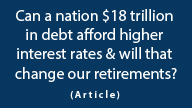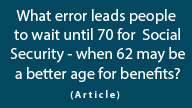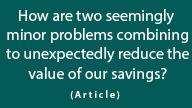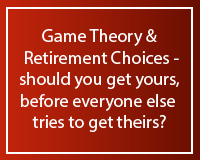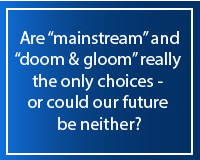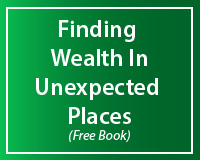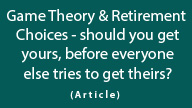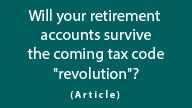Game Theory & Retirement Choices - Should You Get Yours, Before Everyone Else Tries To Get Theirs?
by Daniel R. Amerman, CFA
Below is the 2nd half of this article, and it begins where the 1st half which is carried on other websites left off. If you would prefer to read (or link) the article in single page form, the private one page version for subscribers can be found here:
Retirement Game Theory #3: Getting Less Because Others Took The Available Money First
This much we know - there is a limited amount in the Social Security Trust Funds. And once that is gone, there is very good chance that the rules will change. The rules may change a little, or they may change a lot - but there is quite a good chance that Social Security benefits will be reduced at that time.
Now the US government does have an estimate for when the Trust Funds will run out, and that current estimate is the year 2034. However, it is essential to keep in mind that the government doesn't actually know this for a fact, but rather it is basing that estimate on certain key assumptions - which include what future economic growth will be, what payroll tax collections will be, and what the future earnings in the Trust Funds will be.
There is another absolutely crucial assumption as well, which is the average age at which people start collecting benefits.
Under current law, the government doesn't choose when someone starts collecting benefits, but rather there is a right to collect benefits starting at age 62. Now, the government very much hopes that people will choose to retire later instead of sooner. Because the fewer the people who retire this year and the next year, then the less the money that has to be paid out, and the longer the Trust Funds last. This then delays the unpleasantness when it comes to cutting benefits, or raising taxes, or the day of reckoning when the government has to admit it just can't pay what has been promised.
Also of major importance for when the Trust Funds are depleted is that early retirements reduce payroll taxes, because non-working retirees don't pay payroll taxes.
The Trust Funds are drawn down to the extent necessary to cover the gap between what comes in and what goes out. Early retirements mean lower payroll taxes, so less money comes in. Early retirement also means more benefit payments, so more money goes out. So the more people who choose to collect early - the greater the gap between what comes in and what goes out, and the faster the Trust Funds are depleted.
And the faster the Trust Funds are depleted, then the sooner that benefits are likely to be reduced.
The crucial point here is that the retirement benefit decisions we all make are not in fact independent of each other. If sufficient people choose to collect early, then their choices allow them to consume all of the limited resources available. Which means that none of those limited resources may be available to those who chose to wait for the bigger payments that they were told would be theirs if they were patient and waited.
Oh, they will still be splitting the then current payroll taxes along with all the other beneficiaries. But they won't participate in the benefits paid for by the Social Security Trust Funds because the money was already taken - by someone else.
Now, as explored here, the Social Security Trust Funds are a much stranger beast than most people realize, and aren't really savings at all in the usual sense of the word. But nonetheless, when the Trust Funds run out, then either taxes jump up, or the deficit soars, or benefits get cut, or all three together. And the more people who understand this, then the sooner the Trust Funds run out for everyone who doesn't understand.
Classic Game Theory
The heart of game theory is a zero sum game, where each player's choices impact the outcomes of the other players, and it also often includes differing amounts of information that are available to the different players.
Before writing this analysis, I'd never seen Social Security or other retirement choices analyzed from a genuine game theory viewpoint. Yet, it is in fact a classic case of game theory, particularly if we focus on the Social Security Trust Funds.
There is a limited amount available which will be split by all - so it is "zero sum". By changing their choices, each player can affect the amount of money available for the other players, which is the second key characteristic.
And there are enormous differences in information available. A large portion of the population never reads newspapers or financial websites. Their retirement decisions may be entirely based on their personal circumstances, or on conversations with family members or coworkers who don't know any more than they do.
So, from a game theory perspective, these millions of people can be viewed as almost entirely naive decision makers. They don't have the tools for making optimal decisions, and they aren't even aware the game exists.
On the other hand, there are millions of other people who are seeking out information, in the attempt to make the best decisions that they can. And what they usually find are retirement decision models which do not take into account either a) inflation; b) unfunded liabilities; c) limited balances in the trust funds; or d) other players' choices impacting what is available for them.
So they are making decisions for the game, using a decision framework which precludes the existence of the game. Which leads in most cases to their deferring the collection of retirement benefits for as long as possible.
Now for an informed player who is aware of the game, this is actually a better situation than playing against a naive player. Because a completely naive player will make almost random choices, while a player using a flawed decision model will systematically choose to delay collecting resources for as long as possible, thereby maximizing the time period during which the informed player is able to collect 100% of the available resources (relative to the other player).
Making Informed Decisions
When we started with our hypothetical game of ten people splitting $1 million, some might not have seen the relevance when it comes to making retirement decisions. But as it turns out, four key elements of the game and game theory do very much apply to the real world:
1) We are promised a higher payoff if we just wait until later to collect.
2) Yet we already know the day will come when the money simply isn't there for all of us who have waited to collect.
3) The more people who choose to take what they can get today, then the less that is available for those who are waiting for higher payoffs, and the sooner the benefits get cut.
4) There are widely differing amounts of information available, and most have no idea that the game exists at all.
Your move.
 What you have just read is an "eye-opener" about one aspect of the often hidden redistributions of wealth that go on all around us, every day.
What you have just read is an "eye-opener" about one aspect of the often hidden redistributions of wealth that go on all around us, every day.
 A personal retirement "eye-opener" linked here shows how the government's actions to reduce interest payments on the national debt can reduce retirement investment wealth accumulation by 95% over thirty years, and how the government is reducing standards of living for those already retired by almost 50%.
A personal retirement "eye-opener" linked here shows how the government's actions to reduce interest payments on the national debt can reduce retirement investment wealth accumulation by 95% over thirty years, and how the government is reducing standards of living for those already retired by almost 50%.
 An "eye-opener" tutorial of a quite different kind is linked here, and it shows how governments use inflation and the tax code to take wealth from unknowing precious metals investors, so that the higher inflation goes, and the higher precious metals prices climb - the more of the investor's net worth ends up with the government.
An "eye-opener" tutorial of a quite different kind is linked here, and it shows how governments use inflation and the tax code to take wealth from unknowing precious metals investors, so that the higher inflation goes, and the higher precious metals prices climb - the more of the investor's net worth ends up with the government.
 Another "eye-opener" tutorial is linked here, and it shows how governments can use the 1-2 combination of their control over both interest rates and inflation to take wealth from unsuspecting private savers in order to pay down massive public debts.
Another "eye-opener" tutorial is linked here, and it shows how governments can use the 1-2 combination of their control over both interest rates and inflation to take wealth from unsuspecting private savers in order to pay down massive public debts.







If you find these "eye-openers" to be interesting and useful, there is an entire free book of them available here, including many that are only in the book. The advantage to the book is that the tutorials can build on each other, so that in combination we can find ways of defending ourselves, and even learn how to position ourselves to benefit from the hidden redistributions of wealth.


